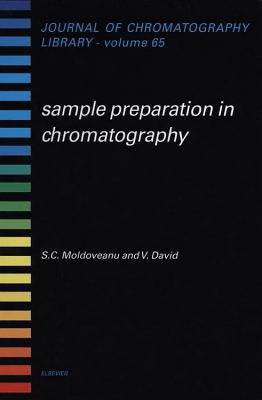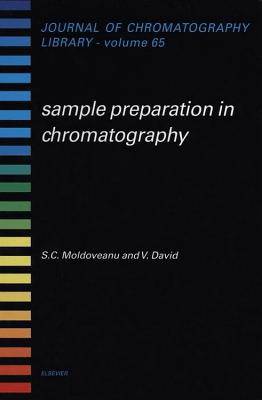
Door een staking bij bpost kan je online bestelling op dit moment iets langer onderweg zijn dan voorzien. Dringend iets nodig? Onze winkels ontvangen jou met open armen!
- Afhalen na 1 uur in een winkel met voorraad
- Gratis thuislevering in België vanaf € 30
- Ruim aanbod met 7 miljoen producten
Door een staking bij bpost kan je online bestelling op dit moment iets langer onderweg zijn dan voorzien. Dringend iets nodig? Onze winkels ontvangen jou met open armen!
- Afhalen na 1 uur in een winkel met voorraad
- Gratis thuislevering in België vanaf € 30
- Ruim aanbod met 7 miljoen producten
Zoeken
Omschrijving
Sample preparation is an essential step in many analyses. This book approaches the topic of sample preparation in chromatography in a methodical way, viewing it as a logical connection between sample collection and analytical chromatography. Providing a guide for choosing the appropriate sample preparation for a given analysis, this book describes various ways to process the sample, explaining the principle, discussing the advantages and disadvantages, describing the applicability to different types of samples, and showing the fitness to specific chromatographic determinations.The first part of the book contains an overview of sample preparation showing its relation to sample collection and to the core chromatographic analysis. The second part covers procedures that do not use chemical modifications of the analyte and includes methods for sample dissolution, concentration and cleanup designed mainly for modifying the initial matrix of the sample. This part starts with conventional separations such as filtration and distillation and finishes with more advanced techniques such as solid phase extraction and electroseparations. The third part gives a description of the chemical modifications that can be performed on a sample either for fractionation purposes or to improve a specific property of the analyte. This part includes derivatizations, polymer chemical degradations, and pyrolysis.
Specificaties
Betrokkenen
- Auteur(s):
- Uitgeverij:
Inhoud
- Aantal bladzijden:
- 942
- Taal:
- Engels
- Reeks:
- Reeksnummer:
- nr. 65
Eigenschappen
- Productcode (EAN):
- 9780444503947
- Verschijningsdatum:
- 8/05/2002
- Uitvoering:
- Hardcover
- Formaat:
- Genaaid
- Afmetingen:
- 175 mm x 250 mm
- Gewicht:
- 1864 g

Alleen bij Standaard Boekhandel
+ 796 punten op je klantenkaart van Standaard Boekhandel
Beoordelingen
We publiceren alleen reviews die voldoen aan de voorwaarden voor reviews. Bekijk onze voorwaarden voor reviews.











